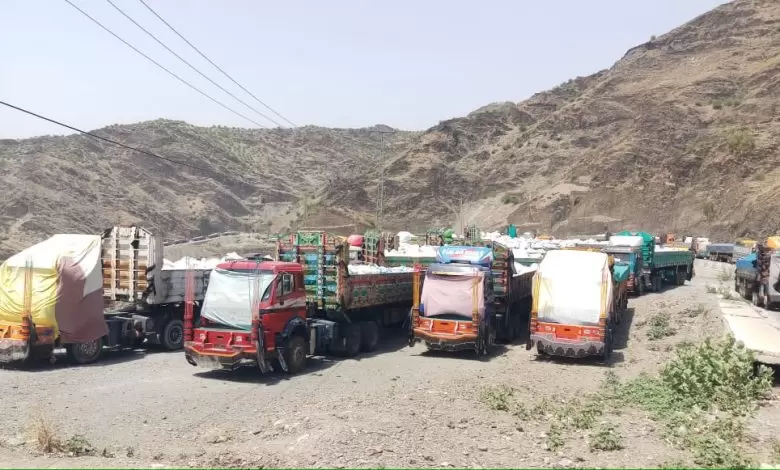
Hundreds of trucks loaded with coal and soapstone imported from Afghanistan remain stranded at the Torkham border for over two weeks due to a customs clearance suspension, leaving traders, transporters, and importers in distress during the busy pre-Eid al-Adha period.
The clearance halt was triggered by customs officials’ refusal to process consignments without a “Certificate of Country of Origin.” According to Mujeeb Shinwari, President of the Torkham Customs Clearing Agents Association, the decision was abruptly implemented two weeks ago, just days before Eid. Traders were informed that customs clearance would only be granted upon submission of origin certificates—causing significant disruptions to their plans and business operations.
Shinwari noted that many traders had intended to finalize clearances and head home for the holidays, but were instead caught off guard. “The sudden enforcement created panic, especially since no prior relaxation was offered despite Eid approaching,” he said.
Also Read: Scorching Heat Grips KP Plains as Mercury Soars to 49°C in D.I. Khan
Meanwhile, Chief Collector of Customs Peshawar Khawaja Khurram Naeem told media that the requirement to provide a Certificate of Origin is a long-standing legal obligation for imports from Afghanistan. “This is already practiced at Ghulam Khan and Kharlachi borders, and Torkham is no different. Importers have been informed about this for the past six months,” he explained, dismissing claims that the move was sudden.
Naeem added that in the past, clearing agents had submitted the required documents, but now hundreds of vehicles have been parked at the border in what he suggested is an attempt to pressure the authorities. He clarified that trucks with complete paperwork are being cleared. “Importers must either submit the Certificate of Origin or the Electronic Import Form (EIF), both of which are legally required,” he said, adding that several facilities are already being extended to importers at Torkham.
Shinwari, however, stated that an appeal had been made to high-level officials in Islamabad for a one-time clearance of already arrived goods before Eid, but it was not accepted. He said customs authorities suspect goods are being imported under the guise of Afghan origin but may originate elsewhere—hence the insistence on documentation.
He acknowledged that discussions had taken place with Afghan officials to obtain the necessary paperwork, but technical issues regarding price, weight, and verification continue to pose challenges. He maintained that coal and soapstone are legally imported from various regions of Afghanistan and that evidence has been shared with customs authorities from time to time. Requests have been submitted to relevant offices in Peshawar, Islamabad, and Kabul to help resolve the matter.
Importers noted that prior to the clearance suspension, around 300 to 350 coal trucks and 100 to 150 soapstone trucks entered Pakistan daily through Torkham, Ghulam Khan, and Kharlachi. The coal is mainly transported to industrial cities in Punjab, while soapstone is moved to Karachi for further export.
The business community has appealed to the government for urgent intervention to restore clearance operations and reduce the economic hardship faced by truck drivers, laborers, and importers still stranded at the border.